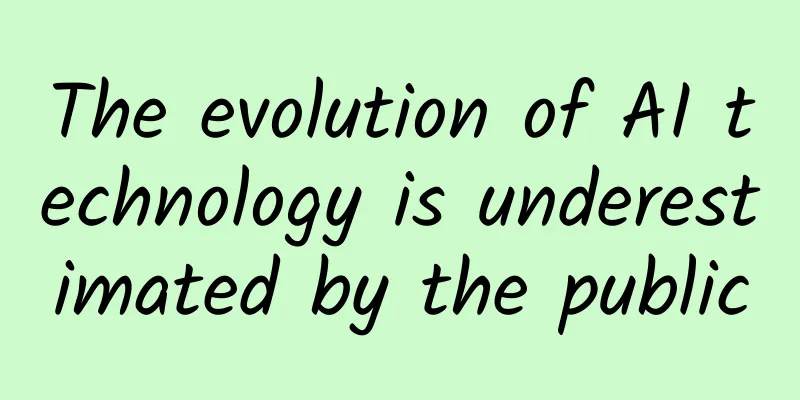The evolution of AI technology is underestimated by the public

|
ChatGPT, recently launched by OpenAI, has become a global hit in just a few days, and has almost become a topic of concern for various media. At first, curious people only used routine questions to test this Internet application. Since the generated results obtained have made a qualitative leap compared to previous AI dialogue applications, more people are using ChatGPT in a bolder way, such as: asking ChatGPT to help write a short video shooting script, help make a hotel decoration plan, and even start using ChatGPT as the input of the Unity 3D editor to do simple 3D application design. As a result, whether it is the technology circle, the financial circle or ordinary people, they are beginning to be excited about the changes brought about by technology. However, in my opinion, there are more questions constantly pouring out of my mind. Let's think about these questions together? What’s the point of ChatGPT being so popular? The topic of AI has been hyped for so many years, but life remains the same? The reason why we don't think AI has changed our lives much is that our previous understanding of new technologies has always focused on specific and tangible objects. For example, we have a deep understanding of the changes brought about by new energy because we often see large areas of photovoltaic power stations, windmills and new energy vehicles on the streets. However, AI technology has brought about huge changes that are subtle and silent. In fact, we use AI every day, and even our daily food, clothing, housing and transportation cannot be separated from AI. For example, from the moment you turn on your mobile phone every day, the mainstream applications in your mobile phone will use a large number of AI calls to help you. When you open the shopping software, the system will use the recommendation algorithm to recommend you the most likely products to buy. When using the navigation software, the background will help you plan the best path through the prediction algorithm, and the voice broadcast uses speech synthesis technology to make the sound more natural like human voice. Even if you don't use a mobile phone, AI is everywhere in life. The parking lot will recognize your license plate through OCR, the hospital will use image recognition to help doctors assist in diagnosis, and there are also automatic driving that everyone often uses. In the past few years, AI has penetrated into all aspects of all walks of life, and it will continue to accelerate its penetration. Our production, life and work are actually inseparable from AI, and the popularity of ChatGPT this time will mark that AI will more profoundly change our work, study and life, even comparable to the Internet technology revolution at the end of the 20th century. What changes will ChatGPT bring? How is it different from the changes brought about by AI a few years ago? Before answering this question, let's first look at what ChatGPT is. ChatGPT is essentially a conversational robot program based on the NLP (natural language processing) model. What is the difference between this conversational robot program and the Microsoft Xiaobing, Xiaomi, and Xiaodu we have used in the past? The difference is that the conversational robot has made a huge leap in intelligence and is very close to or even surpasses the intelligence of human beings in some aspects. This leap in intelligence may bring huge impact and challenges to human society. Our lives, studies, and work will become very different. The technological breakthrough brought by ChatGPT has undergone qualitative changes compared to the popular AI technology innovations in previous years: computer vision (CV), optical character recognition (OCR), speech recognition (ASR), speech synthesis (TTS), reinforcement learning, image synthesis, content recommendation, etc. Where is the change? The change is that in the past, these AIs imitated and replaced human partial intelligence, and these abilities were regarded as tedious and hard work for humans. For example, a few years ago: the airport needed to compare whether the current passengers were ticket buyers, and various important meetings and forums needed to be recorded and organized. Therefore, in the past, these jobs needed to be done by ticket inspectors and stenographers, and the work was very hard. Now, these can basically be done by AI, which is very efficient, and humans can do more creative work, such as being an illustrator, designer, screenwriter or novelist. However, the emergence of ChatGPT is very different. It is aimed at replacing the main functions of the human brain, which means that it can also do more creative work, for example, it can drive diffusion models to generate illustrations, drive various DCC software to design, and write scripts and writing. At this time, do humans feel a chill in their spines? If the AI technology innovation in the past few years has resulted in simple jobs being replaced by machines, then in the next few years, more complex jobs will be replaced by machines. This will profoundly change our lives, studies and work, and create new social challenges. What is the progress of conversational intelligent applications similar to ChatGPT in China? How can ChatGPT be implemented in China? First of all, China has made great progress in the field of AI in the past few years. These technical capabilities are ranked in the first echelon in the world and are comparable to those of the United States. However, compared with mature AI technologies such as computer vision (CV), optical character recognition (OCR), speech recognition (ASR), speech synthesis (TTS), reinforcement learning, image synthesis, content recommendation, etc., we no longer have a technical gap. Our AI scientists and engineers can independently design network models and algorithms; in NLP technology, there is still a gap, which is even greater than the technical gap between Google, Microsoft and OpenAI. In the past few years, the popular NLP models in China are still based on Google's Transformers model and the upgraded Bert model. Although there have been ultra-large-scale multimodal models released by domestic technology companies in the past two years, and the scale of model parameters is said to exceed the 175 billion parameters of the GPT-3 model, since these models have not yet been made available for public testing in the form of online services, it is impossible to judge the gap with ChatGPT. However, we can also judge from another perspective, that is, the computing scale of model training. The training computing amount of GPT-3 is equivalent to 1024 latest GPU chips training in parallel for 30 days. So far, no domestic company has claimed to have used AI training clusters of this scale or larger. Judging from this, there is still a gap in China. Referring to the speed of catching up in mature AI in the past, and considering the improvement of domestic R&D capabilities, the gap should be about 1-2 years. In other words, we may achieve NLP capabilities comparable to or better than the current ChatGPT in 2024 to 2025. As for how ChatGPT will be implemented in China, we must first look at the implementation of ChatGPT in the United States. ChatGPT provides services in the United States in the form of Web applications and standard APIs, and is deployed in the form of cloud services. The reason for being based on cloud services is mainly because the model is extremely large and there are many users, and the required computing resources can only be based on the unlimited computing power of the cloud. In other words, if users want to use ChatGPT, they must provide all data to the ChatGPT data center. Therefore, for well-known reasons, it is unlikely that ChatGPT will be allowed to be used openly in China, and it is impossible for the other country to deploy such a large model data and high-tech software in China. The most likely way is for Chinese companies to develop their own ChatGPT-like applications. Just a few days ago, a well-known domestic Internet company, Baidu, announced that it would develop a similar chatbot. In addition to Baidu, there are several Internet technology companies in China that have such strength. Perhaps driven by this wave of popularity, domestic NLP will usher in a breakthrough. Let's wait and see. How do ordinary people get along with ChatGPT? This is not about getting along with ChatGPT, but getting along with AI technologies like ChatGPT. First of all, as we have discussed before, AI like ChatGPT is essentially a simulation and replacement of human brain functions, and its impact on society can be viewed from both positive and negative aspects. First of all, let's look at the positive aspects. Thanks to the blessing of ChatGPT, many professional abilities can be supplemented by AI like ChatGPT, and ordinary people can also transcend the constraints of these professional abilities and use their imagination to produce abilities that surpass human + machine intelligence. This is just like ordinary people can use mobile phones + fool-proof short video editing tools to shoot videos that only professionals could shoot in the past. This will greatly reduce the professional threshold of many jobs and fully liberate everyone's creativity. However, it will also bring a negative side. And the negative side brings more problems. One is that many language-related positions will be replaced by ChatGPT, and many white-collar positions will disappear, including programmers (programmers are computer language users). Instead, a small number of elite programmers are needed, and other jobs will be supplemented by ChatGPT. Secondly, due to the low-cost creation capability brought by ChatGPT, humans are very likely to be overwhelmed by the content created by machine intelligence. The only way to think of is to use ChatGPT to deal with ChatGPT, and use magic to defeat magic. However, it is not optimistic at present. For example, the current apps that provide information flow and video flow through recommendation algorithms have already overwhelmed humans with content created by humans. The super apps we are familiar with have almost become killers of time and energy. These may not be solved simply by relying on technology or the self-discipline of technology manufacturers. Let’s talk about how ordinary people get along with AI. They treat it as a new tool for production and life, and use it to unleash their creativity and amplify the capabilities of human + machine intelligence. Is ChatGPT the biggest crisis that AI technology brings to mankind? Let me share a picture, which is the picture above. I searched for this picture on Bing.com in June 2021. To this day, I am amazed at the accuracy of the time prediction of this picture. In fact, there is a clear logic behind it. There are many similar pictures. The logic behind it is the improvement of machine intelligence brought about by the reduction of human computing costs. There are actually several key time points in the picture: 2015, 2023, and 2045. In 2015, it was mainly the breakthrough of ordinary AI technology that I mentioned earlier. The breakthrough in 2023 is speculated to be the transcendence of human single intelligence brought about by NLP technology such as ChatGPT. The time point of 2045 is the biggest crisis, that is, machine intelligence will exceed the intelligence of all mankind. How to understand it? If you have watched "The Wandering Earth 2", you can understand it as the intelligence of MOSS, which will be stronger than the intelligence of all human beings. At this time, many things seem to be beyond the decision of humans themselves. In many movies and TV shows in the past, we often encounter situations where AI on computers has consciousness and goes out of control. Even if the AI system on the computer does not have self-awareness, it is still very disturbing if such an AI system controls the information of all mankind. It can control elevators, production lines, traffic lights, trains, airplanes, radars, towers, self-driving cars, surgical robots, life support systems, communication networks, etc., right? However, every time there is a technological revolution, everyone seems to be very uneasy, but humans can always turn danger into safety. It may be wiser to look forward to the benefits brought by technological progress. As a winner of Toutiao's Qingyun Plan and Baijiahao's Bai+ Plan, the 2019 Baidu Digital Author of the Year, the Baijiahao's Most Popular Author in the Technology Field, the 2019 Sogou Technology and Culture Author, and the 2021 Baijiahao Quarterly Influential Creator, he has won many awards, including the 2013 Sohu Best Industry Media Person, the 2015 China New Media Entrepreneurship Competition Beijing Third Place, the 2015 Guangmang Experience Award, the 2015 China New Media Entrepreneurship Competition Finals Third Place, and the 2018 Baidu Dynamic Annual Powerful Celebrity. |
<<: Why do telephone scams prefer using the 170 number?
>>: Capterra: 2024 US Technology Trends Report
Recommend
Xiaomi's first pure electric sedan may be unveiled at the end of October and has now entered the trial production stage
Xiaomi Group (01810.HK)'s road to car manufac...
Tik Tok short video operation and promotion methods!
Everyone wants to join Douyin to get a piece of t...
Low-temperature burns may cause cancer! How to use portable heating equipment safely?
The first cold wave of the year is coming! Recent...
Toyota's autonomous driving is not far behind and plans to officially put e-Palette into production in 2020
According to foreign media reports, despite being...
iOS 13's new feature "Apple Login" is mandatory and sparks controversy
When Apple announced the new "Sign in with A...
Microsoft Ventures Accelerator and Fenxiang Sales and Testin Cloud Testing Strategic Cooperation
On January 24, the Microsoft Ventures Accelerator...
Infrastructure maniac, he has his own tricks for sand control!
In recent years, going to the desert for fun has ...
10 little habits after meals that many people take for granted, 1 of which is really not recommended
Regarding "what you can and cannot do after ...
Analysis of JD.com’s flash sales products
Various e-commerce software will have some specia...
27 quick money-making projects for lazy people
Real-life cases + practical techniques will teach...
How did the little cricket change from a "cricket" to a "food"?
Crickets, this tiny insect, have been closely con...
User Operations: The Value of User Retention to Growth
Nowadays, the cost of acquiring customers is gett...
Some people say that the universe is just a biological cell. Do you believe it? Let science reveal the truth
This article is based on answering a question fro...
6 reasons why Douyin live broadcast room was banned!
Douyin is currently strictly regulating the behav...
With over 10 million daily active users, how does Qutoutiao operate?
As Pinduoduo went public and its stock price soar...









